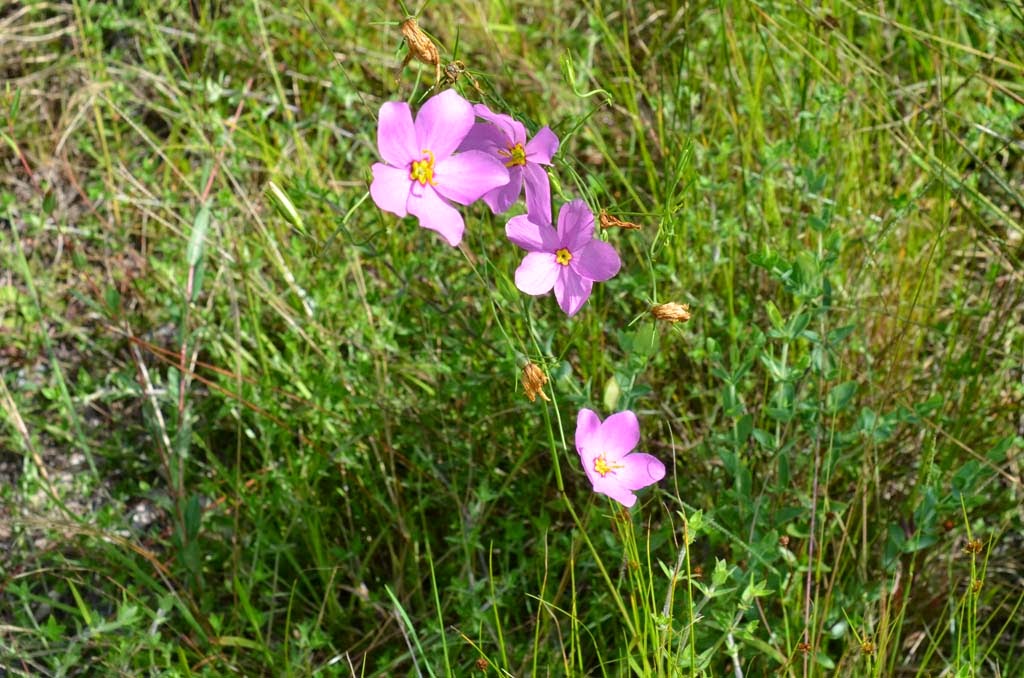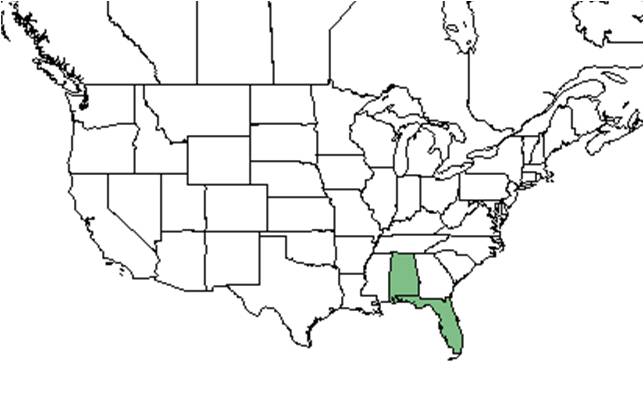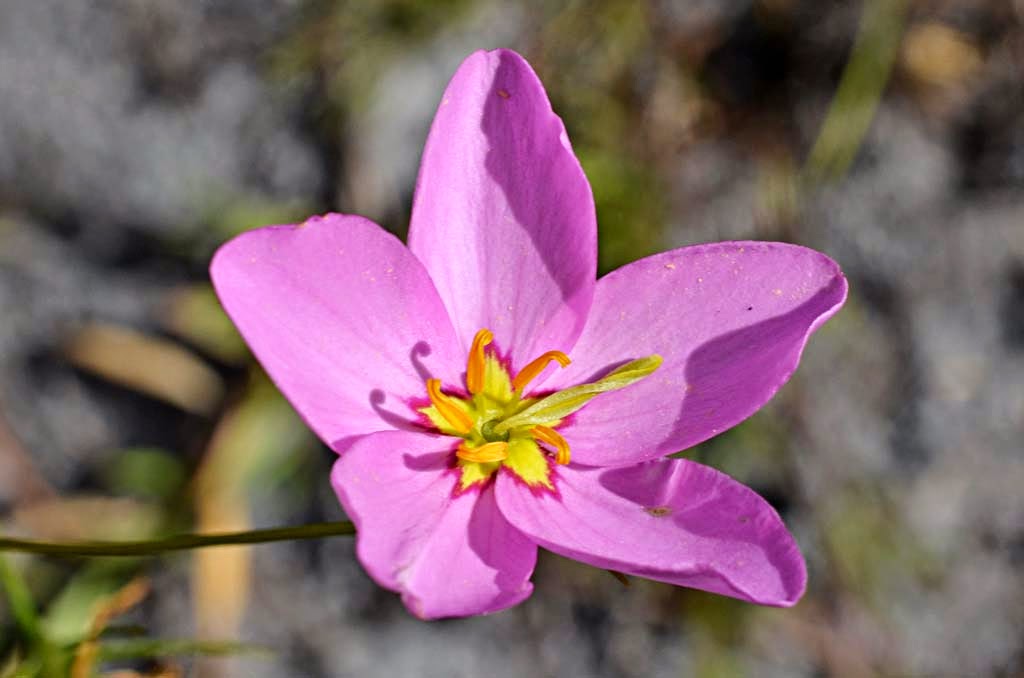Difference between revisions of "Sabatia grandiflora"
(→Description) |
HaleighJoM (talk | contribs) (→Ecology) |
||
| (30 intermediate revisions by 8 users not shown) | |||
| Line 3: | Line 3: | ||
{{taxobox | {{taxobox | ||
| name = Sabatia grandiflora | | name = Sabatia grandiflora | ||
| − | | image = | + | | image = Saba_gran.jpg |
| − | | image_caption = | + | | image_caption = Photo by Wayne Matchett, [http://www.spacecoastwildflowers.com SpaceCoastWildflowers.com] |
| regnum = Plantae | | regnum = Plantae | ||
| divisio = Magnoliophyta - Flowering plants | | divisio = Magnoliophyta - Flowering plants | ||
| Line 15: | Line 15: | ||
| binomial_authority = (A. Gray) Small | | binomial_authority = (A. Gray) Small | ||
| range_map = saba_gran_dist.jpg | | range_map = saba_gran_dist.jpg | ||
| − | | range_map_caption = Natural range of ''Sabatia grandiflora'' from USDA NRCS [http:// | + | | range_map_caption = Natural range of ''Sabatia grandiflora'' from USDA NRCS [http://plants.usda.gov/core/profile?symbol=SAGR8 Plants Database]. |
}} | }} | ||
| + | |||
| + | Common name: Largeflower rose gentian | ||
| + | ==Taxonomic notes== | ||
==Description== | ==Description== | ||
<!-- Basic life history facts such as annual/perrenial, monoecious/dioecious, root morphology, seed type, etc. --> | <!-- Basic life history facts such as annual/perrenial, monoecious/dioecious, root morphology, seed type, etc. --> | ||
| − | + | ''S. grandiflora'' is an upright native annual herb with showy pink flowers on an almost leafless stems, that can reach up to 1 meter tall. The leaves are opposite, linear, inconspicuous, and fleshy. The flower is a 5-pointed star, deep to pale pink, with a yellow and red mark at the base of each petal that forms a small yellow star. The twisted yellow stigma and the protruding green ovary are held terminally and in upper leaf axils. The fruit is a small capsule.<ref name="enature">[[http://www.enature.com/fieldguides/detail.asp?recNum=WF0713]]Enature. Accessed: March 15, 2016</ref> | |
==Distribution== | ==Distribution== | ||
| + | ''Sabatia grandiflora'' is distributed in the Coastal Plain from Florida to Alabama and Virginia<ref name="eol">[[http://eol.org/pages/581379/details]]Encyclopedia of Life. Accessed: March 14, 2016</ref> with disjunct populations in western Cuba.<ref>Sorrie, B. A. and A. S. Weakley 2001. Coastal Plain valcular plant endemics: Phytogeographic patterns. Castanea 66: 50-82.</ref> | ||
| + | |||
==Ecology== | ==Ecology== | ||
===Habitat=== <!--Natural communities, human disturbed habitats, topography, hydrology, soils, light, fire regime requirements for removal of competition, etc.--> | ===Habitat=== <!--Natural communities, human disturbed habitats, topography, hydrology, soils, light, fire regime requirements for removal of competition, etc.--> | ||
| + | In the Coastal Plain in Florida and Georgia, ''Sabatia grandiflora'' occurs in pine-wiregrass-saw palmetto flatwoods, karst pond shores, and longleaf pine wiregrass communities.<ref name="fsu">Florida State University Robert K. Godfrey Herbarium database. URL: http://herbarium.bio.fsu.edu. Last accessed: November 2015. Collectors: Robert K. Godfrey, J.M. Kane, Edwin Keppner, R.A. Norris. States and Counties: Florida: Bay, Putnam, Taylor, Wakulla, Washington, Volusia. Georgia: Thomas. Compiled by Tall Timbers Research Station and Land Conservancy.</ref> Within its distribution in the Coastal Plain, habitats include moist sites, wet prairies and flatwoods, and bogs.<ref name="enature"/> | ||
| + | |||
===Phenology=== <!--Timing off flowering, fruiting, seed dispersal, and environmental triggers. Cite PanFlora website if appropriate: http://www.gilnelson.com/PanFlora/ --> | ===Phenology=== <!--Timing off flowering, fruiting, seed dispersal, and environmental triggers. Cite PanFlora website if appropriate: http://www.gilnelson.com/PanFlora/ --> | ||
| − | ===Seed dispersal=== | + | Flowers and fruits in June and July.<ref name="fsu"/><ref>Nelson, G. [http://www.gilnelson.com/ PanFlora]: Plant data for the eastern United States with emphasis on the Southeastern Coastal Plains, Florida, and the Florida Panhandle. www.gilnelson.com/PanFlora/ Accessed: 19 MAY 2021</ref> |
| − | ===Seed bank and germination=== | + | <!--===Seed dispersal===--> |
| − | ===Fire ecology=== <!--Fire tolerance, fire dependence, adaptive fire responses--> | + | <!--===Seed bank and germination===--> |
| + | <!--===Fire ecology===--> <!--Fire tolerance, fire dependence, adaptive fire responses--> | ||
===Pollination=== | ===Pollination=== | ||
| − | + | ''Sabatia grandiflora'' was observed at the Archbold Biological Station to host bees such as ''Bombus impatiens'' (family Apidae) and sweat bees from the Halictidae family such as ''Augochlorella aurata, Halictus poeyi, Lasioglossum coreopsis, L. nymphalis, L. puteulanum'' and ''L. tamiamensis''.<ref name="Deyrup 2015">Deyrup, M.A. and N.D. 2015. Database of observations of Hymenoptera visitations to flowers of plants on Archbold Biological Station, Florida, USA.</ref> | |
| + | <!--===Herbivory and toxicology===<!--Common herbivores, granivory, insect hosting, poisonous chemicals, allelopathy, etc--> | ||
| + | <!--===Diseases and parasites===--> | ||
| − | + | ==Conservation, cultivation, and restoration== | |
| − | + | ==Cultural use== | |
| − | + | ==Photo Gallery== | |
| + | <gallery widths=180px> | ||
| + | File: Sabat_gran-WMatchett_SpaceCoastWildfl-flwr.jpg | <center> Flower of ''Sabatia'' ''grandiflora'' <p> Photo by Wayne Matchett, [http://www.spacecoastwildflowers.com SpaceCoastWildflowers.com] </p> | ||
| + | </gallery> | ||
| − | + | ==References and notes== | |
| − | |||
| − | + | Florida State University Robert K. Godfrey Herbarium database. URL: [http://herbarium.bio.fsu.edu http://herbarium.bio.fsu.edu]. Last accessed: November 2015. Collectors: Robert K. Godfrey, J.M. Kane, Edwin Keppner, R.A. Norris. States and Counties: Florida: Bay, Putnam, Taylor, Wakulla, Washington, Volusia. Georgia: Thomas. Compiled by Tall Timbers Research Station and Land Conservancy. | |
| − | |||
| − | |||
| − | |||
| − | |||
| − | |||
| − | |||
| − | |||
| − | |||
| − | |||
Latest revision as of 11:47, 15 July 2022
| Sabatia grandiflora | |
|---|---|

| |
| Photo by Wayne Matchett, SpaceCoastWildflowers.com | |
| Scientific classification | |
| Kingdom: | Plantae |
| Division: | Magnoliophyta - Flowering plants |
| Class: | Magnoliopsida – Dicotyledons |
| Order: | Gentianales |
| Family: | Gentianaceae |
| Genus: | Sabatia |
| Species: | S. grandiflora |
| Binomial name | |
| Sabatia grandiflora (A. Gray) Small | |

| |
| Natural range of Sabatia grandiflora from USDA NRCS Plants Database. | |
Common name: Largeflower rose gentian
Contents
Taxonomic notes
Description
S. grandiflora is an upright native annual herb with showy pink flowers on an almost leafless stems, that can reach up to 1 meter tall. The leaves are opposite, linear, inconspicuous, and fleshy. The flower is a 5-pointed star, deep to pale pink, with a yellow and red mark at the base of each petal that forms a small yellow star. The twisted yellow stigma and the protruding green ovary are held terminally and in upper leaf axils. The fruit is a small capsule.[1]
Distribution
Sabatia grandiflora is distributed in the Coastal Plain from Florida to Alabama and Virginia[2] with disjunct populations in western Cuba.[3]
Ecology
Habitat
In the Coastal Plain in Florida and Georgia, Sabatia grandiflora occurs in pine-wiregrass-saw palmetto flatwoods, karst pond shores, and longleaf pine wiregrass communities.[4] Within its distribution in the Coastal Plain, habitats include moist sites, wet prairies and flatwoods, and bogs.[1]
Phenology
Flowers and fruits in June and July.[4][5]
Pollination
Sabatia grandiflora was observed at the Archbold Biological Station to host bees such as Bombus impatiens (family Apidae) and sweat bees from the Halictidae family such as Augochlorella aurata, Halictus poeyi, Lasioglossum coreopsis, L. nymphalis, L. puteulanum and L. tamiamensis.[6]
Conservation, cultivation, and restoration
Cultural use
Photo Gallery
Flower of Sabatia grandiflora Photo by Wayne Matchett, SpaceCoastWildflowers.com
References and notes
Florida State University Robert K. Godfrey Herbarium database. URL: http://herbarium.bio.fsu.edu. Last accessed: November 2015. Collectors: Robert K. Godfrey, J.M. Kane, Edwin Keppner, R.A. Norris. States and Counties: Florida: Bay, Putnam, Taylor, Wakulla, Washington, Volusia. Georgia: Thomas. Compiled by Tall Timbers Research Station and Land Conservancy.
- ↑ 1.0 1.1 [[1]]Enature. Accessed: March 15, 2016
- ↑ [[2]]Encyclopedia of Life. Accessed: March 14, 2016
- ↑ Sorrie, B. A. and A. S. Weakley 2001. Coastal Plain valcular plant endemics: Phytogeographic patterns. Castanea 66: 50-82.
- ↑ 4.0 4.1 Florida State University Robert K. Godfrey Herbarium database. URL: http://herbarium.bio.fsu.edu. Last accessed: November 2015. Collectors: Robert K. Godfrey, J.M. Kane, Edwin Keppner, R.A. Norris. States and Counties: Florida: Bay, Putnam, Taylor, Wakulla, Washington, Volusia. Georgia: Thomas. Compiled by Tall Timbers Research Station and Land Conservancy.
- ↑ Nelson, G. PanFlora: Plant data for the eastern United States with emphasis on the Southeastern Coastal Plains, Florida, and the Florida Panhandle. www.gilnelson.com/PanFlora/ Accessed: 19 MAY 2021
- ↑ Deyrup, M.A. and N.D. 2015. Database of observations of Hymenoptera visitations to flowers of plants on Archbold Biological Station, Florida, USA.
